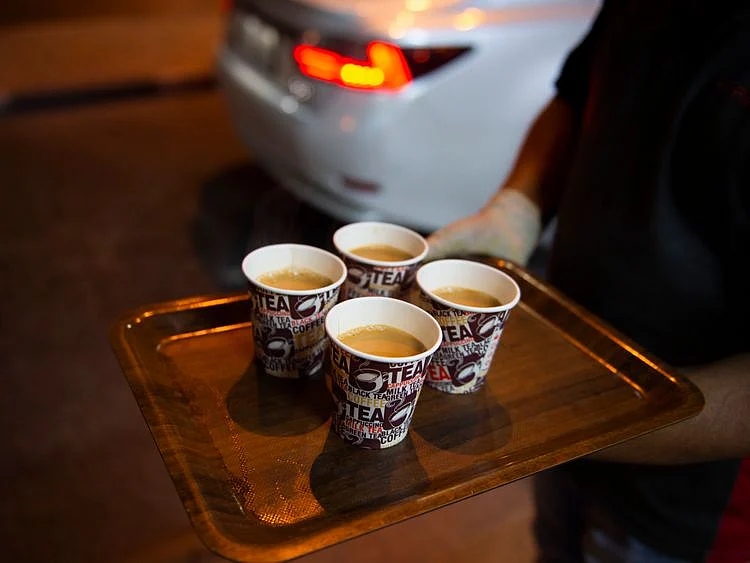Inflation hits Dubai’s karak tea, a beloved staple
The UAE’s informal national drink has long been priced at Dh1

Dubai: From Mustafa Moeen’s spot behind the counter, he sees the many faces of Dubai. They come -- tired, hungry, stressed out -- for a respite and a cup of karak.
Labourers stop on the way to work. Cab drivers linger after long shifts. Some residents cruise by on midnight joyrides. A cup of milky sweet tea to ease the burden of the day, customers say, long priced at just Dh1.
But now, as supply chain shortages and Russia’s war on Ukraine lead to price spikes on everything from breakfast sandwiches in Manhattan to chicken tinga in Mexico, Dubai tea sellers are bumping up prices of what’s informally considered the national drink of the UAE. Moeen says he had no choice but to raise the price to Dh1.50.
“Everything got more expensive for us -- milk, sugar, tea bags. Even the price of cups doubled,” Moeen said from the one-room storefront in Satwa. “We also have to survive.”
For nearly two decades, karak has largely been the same price.
“It’s not about the 50 fils. They are making small, small changes,” said Zeeshan Razak, an accountant from Kerala, India, sipping tea with his colleague. “We are concerned about what it means.”
It was one of the rare treats that a dirham could buy in Dubai.
“It’s part of its brand that it costs Dh1,” said Abdulla Moaswes, a Palestinian karak aficionado raised in the UAE who’s known for his scholarship on the tea. “People stockpile the coins so they always have one on hand.”
Oil-rich Gulf Arab governments have reaped a windfall since the world’s economic recovery from COVID-19 and Moscow’s attack on Ukraine boosted global energy prices.
But rising inflation has taken a toll. The price of another sweet staple in Dubai long worth Dh1, the McDonald’s soft-serve ice cream cone, recently spiked to Dh2. McDonald’s UAE franchisee said it made the “difficult decision” due to a spike in “operating, equipment, manpower and the raw material costs”.
Though modest in size, a cup of karak contains volumes in terms of the UAE’s history.
The oil boom of the 1970s brought millions of migrants to the Gulf Arab states, along with their tea preferences. Indians and Pakistanis building up the coastal emirates craved masala chai, but lacked the money to buy fresh milk and the time to slow-cook tea over a coal fire. They needed quick chai at the cheap that could be stored and served in vast quantities at construction sites.
“Karak was born from necessity,” said Moaswes, the karak scholar. “It’s what the economic situation allowed for decades ago.”
The tea exploded in popularity over the years, becoming a social ritual, as well as an indispensable routine. The trend spread to Emiratis, who traditionally brew their Arabic tea ink-black but now claim the milky chai as part of their heritage. Dubai’s tourism authority promotes top karak spots to visitors.
“It’s nostalgic for me. That was breakfast on a daily basis, roaming around in our cars,” recalls Ahmed Kazim, an Emirati who helped found a popular upscale karak shop, Project Chaiwala. “It’s the UAE culture. You’ll see a guy with a bicycle pull up next to a Lamborghini.”
The price of karak was 50 fils for a quarter-century, rising to Dh1 in 2004 as Dubai rushed to build its booming desert skyline.
Some fear that if prices continue to climb, the staple may be lost to the working class who created it.
Shashank Upadhyay, a bakery owner in Dubai’s old Karama neighborhood, tried to sell karak for Dh2 earlier this year. But he swiftly backpedaled after seeing his customers “disturbed”.
“In this area, chai is too important,” Upadhyay said. “If we keep raising it, it will become something for people who go to high-end restaurants. But it’s for local working people, like us.”
Sign up for the Daily Briefing
Get the latest news and updates straight to your inbox
Network Links
GN StoreDownload our app
© Al Nisr Publishing LLC 2026. All rights reserved.